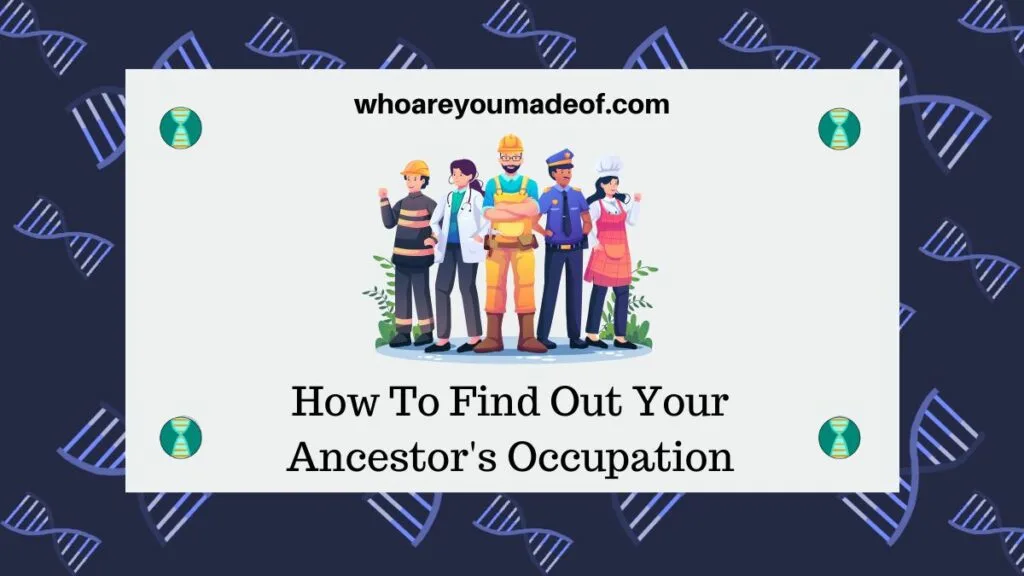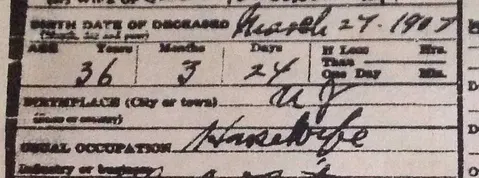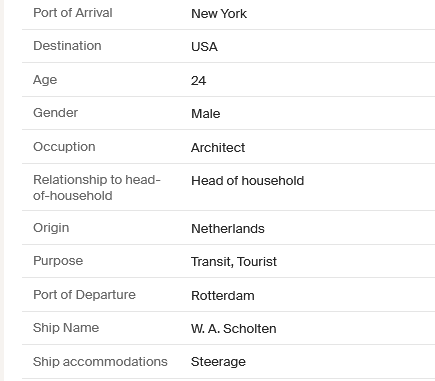Do you want to know what your ancestor's occupation was? In this post, you will find eleven different ideas for places to look for the information you need.

Finding out what your ancestor did for a living has a lot of benefits for those of us who do family tree research. Apart from helping us feel more connected to our ancestor and providing important context about their life, it can also:
- Help us find additional information about our ancestor
- Provide important details that can help us distinguish between other genealogy records belonging to people with the same or similar name
- Assist you in determining how your ancestor met their spouse
I have discovered so many interesting stories related to my ancestors' occupations. Sometimes, I have even found surprises.
For example, my great-great-great grandfather, a Prussian-born immigrant, was a janitor at a church for many of his working years. He raised seven children in Chicago on the salary of a church janitor, which is something that would be very difficult to accomplish today.
Our ancestors often changed occupations. There were a variety of reasons that would cause them to do this, but we can assume that most of the time it was out of necessity or because they could earn better pay in another field.
The first occupation that I found for my Prussian ancestor was cabinetmaker, which I found very interesting because there are several other people on that side of the family who were involved in carpentry. My grandfather (my ancestor's grandson) had a lifelong interest in making things with wood, and we spent time in his basement making wooden items.
I don't know if I'll ever discover exactly why he stopped working as a cabinetmaker, but I will keep exploring.
Let's get started learning how you can find records to help you discover the type of work that your ancestors did so you can discover your own family stories!
Check census records
If your ancestor was living in the United States and lived during the 1800-1900s, you might be able to find their occupation on the US Federal Census. The census has been taken every ten years since 1790, and we see questions about occupation included on every census since 1850.
It is important to note that we usually only see occupations reported for male heads of household and their working-aged sons. While women certainly did work, their economic contributions were not always reported in an official capacity.
If your female ancestor was the head of house, such as would be the case if she was widowed, her occupation may have been recorded. I remember finding a record like this for one of my female ancestors who was working as a washerwoman to support her young son, since she had been widowed the year prior to the census.
Examine city directories
City directories were published for many US cities and towns from the middle of the 19th century through the first decades of the 20th. They were replaced by telephone books, which were eventually separated into the white pages and the yellow pages.
If your ancestor was in the city directory for the place that they lived, their occupation might be listed next to their name. The image below is from an 1886 city directory for Chicago, Illinois.

These types of directories were often at least partially supported by the sale of advertisements, so there are also ads for various companies and businesses sprinkled throughout. If you knew that your ancestor had a big business, you could also look through to see if they also advertised in the directory.
Locate their vital records
We may, upon occasion, find our ancestor's occupation listed on a vital record, including birth, marriage and death records. While our ancestor wasn't likely employed when they were born, their father likely had an occupation and it might have been noted on the record.
In addition, we often see occupation listed on death certificates. This provides an insight into our ancestor's occupation at the time of their death.

The image above is from my great-grandmother's death certificate from 1943. She was reported to have been a housewife when she died of tuberculosis at the age of 36.
Look in old newspapers
Old newspaper articles might have mentions of our ancestors. Since one's type of employment, or lack thereof, has long been an indicator of social standing, an occupation is often mentioned in newspaper articles, even when the employment is irrelevant to the subject article.
When I have found articles about my ancestors in the newspaper, their occupation is often listed. I think specifically about an article where one of my ancestors was a victim of a shooting (he survived!), and he was listed to be a barber.
Perhaps this detail was mentioned in order to portray my ancestor as gainfully employed in contrast to the unemployed perpetrator of the crime.
Look at their draft card
If your ancestor was male and lived in the United States during World War I or World War II, they likely filled out a draft registration card, unless they were considered elderly at the time of registration.
One of my great-great grandfathers was 59 and filled out a draft registration card in 1942. He is listed as working for Modern Die and Stamping Co in Los Angeles, and this lines up with what other occupations I have seen listed for him on other records.

Depending on the name of the employer listed on your ancestor's record, you might be able to deduce what their occupation was at the time that they filled it out.
See if you can find their employment records
If you know where your ancestor was employed, from perhaps their draft card or another document, you can try to locate employment records from that organization. These records, should they still exist, could help you know exactly what role your ancestor had at the company.
Employment records can be difficult to locate, and most are not available online, so you might have to contact their employer in order to ask for their records.
One of my cousins was able to obtain my great-grandfather's personnel records from the Newark Police Department in New Jersey. There, I was able to see his badge number and details of his employment as a police officer, including to which precincts he had been assigned.
Check out church records
Your ancestor's occupation may have been listed in a church record, such as when a sacrament is performed and recorded in the church books. I have found church records for my ancestors in Germany, Poland, and Slovakia where the occupation of my male relatives was mentioned.
In the below marriage record, my great-great-great grandfather's occupation was mentioned to be "journeyman tailor" at the time of his marriage to my 3rd great-grandmother.

I don't know if he worked as a tailor for the rest of his career because he passed away seven years after his marriage and thus couldn't accompany his wife and young son to the United States.
Seek out their last will and testament
We can sometimes find our ancestor's occupation or clues about their employment in their last will and testament. There are many wills and probate records on Family Search (for free) and visible on Ancestry for those who have a subscription.
If your ancestor's occupation is not listed in their will, you might be able to find clues about what they may have done for a living in the inventory list of their possessions, if one was made.
For example, a farmer would have land, animals, and farm equipment to either sell or leave to their heirs. A blacksmith ancestor who made horseshoes would have had farrier supplies in their possession.
Find their obituary
Obituaries, especially those that are written with genealogy in mind, will often mention how the person who died spent their time. If they were employed, they probably dedicated a lot of their years to their career and so this would be mentioned in their obituary.
An obituary that I found for one of my ancestors was published in the Chicago Tribune because my ancestor's house had been destroyed in the Great Chicago Fire of 1871. He was retired before he died, and this was mentioned in the obituary.
Coincidentally, this is the same ancestor who worked as a janitor that I mentioned earlier in this article. In his obituary, he is referred to as a retired carpenter.
Search for their immigration records
Our ancestor's occupation might be listed on their immigration records or passenger lists. You can find passenger lists and immigration records on Family Search and Ancestry, among many other places.
If our ancestor didn't have a trade that they identified strongly with, they may have been listed as a "laborer" or a "farmer". However, sometimes people did make a point to tell the clerk their occupation, such as was the case with one of my ancestors.

Check their personal papers
My final idea for finding out what your ancestor did for work is to check their personal papers or any documents that you have that may have belonged to them. If you are lucky enough to have any of their letters or papers, you might find references to their work contained within them.
For example, in papers that were left behind by my great-grandfather, I found Christmas cards sent to him by former coworkers that he had stayed in touch with.
Conclusion
I hope that this article has helped you get several ideas of new places to look for occupation details for your ancestor, and that you are able to find new information about what they did for a living during their lifetime.
If you have any questions about something that you read in this post, or if you would like to share an unusual place to look where you have found occupation information, I would love to hear from you in the discussion below.
Thanks for stopping by!
